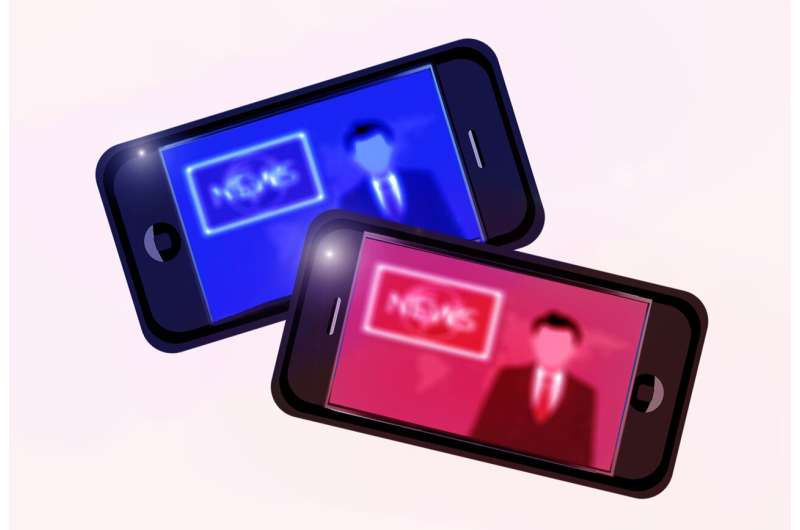This article has been reviewed according to Science X's editorial process and policies. Editors have highlighted the following attributes while ensuring the content's credibility:
fact-checked
trusted source
proofread
Social media influencers may affect more than voter opinions

If Thanksgiving dinner conversations have turned into heated political arguments over the past two decades, social media may be to blame. Popular social media figures—or influencers—who create or share distorted political messages may cause political parties to moderate their policies to win over independent voters in general elections but tend to polarize the rest of society, according to researchers who created a model to study how social media may affect election cycles.
The researchers reported their findings today (Dec. 1) in the journal Management Information Systems Quarterly.
"Social media has become entrenched in day-to-day events and especially in the last few election cycles. The discussion around social media has focused on its role in polarizing people," said study co-author Wael Jabr, assistant professor of supply chain and information systems at Penn State. "Are we sure that social media is indeed the culprit? Previous research shows that polarization has been on the increase for the last three or four decades, way before social media came into our lives. This became the driver to do a study on the impact of social media on the whole election cycle—on people, candidates and traditional media like newspapers and TV."
The researchers used a "Hotelling" model to study how social media influencers may affect political parties, citizens and traditional media outlets. Widely used in business and political science, the model provides a framework to simplify social interactions among multiple participants and better understand their decision-making.
"One way to study social media's effects on elections is to collect data and see what is happening, but as we studied and tried to understand the social media phenomenon, we realized that it's complex," Jabr said. "We decided, as a first step, to look at the phenomenon analytically through a model, which removes all the noise and lets us focus on a couple factors—in this case, social media influencers."
Imagine the model as a line with political party A on the extreme left and political party B on the extreme right, with the citizen, or median voter, somewhere in between, explained Jabr. Each party takes a position on a topic, like taxation or immigration, that stands in stark contrast to the other party's position. The voter may start closer on the line to party A, but with the right amount of effort, party B can persuade the voter to go the extra distance and support the party.
The research team used this base framework to model how political parties, median voters and traditional media outlets interact without social media. In this base scenario, political parties and media outlets have information that is not immediately available to citizens, but which citizens need to make decisions about whom to vote for in the general election. Then the research team added influencers, who also have access to this information, to the equation to study how social media could affect each group.
The researchers found that when social media influencers share distorted political messages, like misinformation and disinformation, to gain followers and increase their profits, political parties have to moderate their policy positions to attract median voters and win general elections. However, traditional media outlets' editorial positions become more extreme, and the opinions of citizens swayed by influencers grow more polarized.
"We found that the introduction of social media changes a party's policy positions in two ways: there is an ideology effect, and there is an election effect," Jabr said.
Each political party conforms to a specific ideology, such as supporting high or low tax rates for wealthy individuals. In American elections, the ideology effect plays a more prominent role in primary elections, where party policy positions tend to tilt toward the extremes, according to Jabr. But the median voter is best understood as a moderate independent, and independents make up roughly one-third of the American electorate. These voters can tip the general election toward one party or the other, which is where the election effect comes in to play. Parties have to moderate their policy positions—such as lowering their proposed tax rates for the highest income brackets—to persuade independent voters to support them and win general elections, Jabr said.
Social media influencers have a more extreme effect on the rest of society, according to the researchers. As more people turn to social media for their news, influencers and traditional media outlets begin competing for the same audiences. To stand out from the crowd and attract more followers, influencers distort their messaging. In response, the opinions of citizens who are swayed by the influencers become more polarized. Traditional media outlets continue reporting objective news, said Jabr, but their editorial positions—think of political pundits who offer opinions instead of objective analysis on trending news stories—become more extreme as well.
"On the one hand, enhanced communication technologies enable voters to be more informed of public policies, so policymakers need to take into account this effect and moderate their positions," he said. "On the other hand, technological advancements also make information distortion less costly for influencers, leading to a more polarized society."
The findings suggest that policymakers need to consider the effects of social media while putting in place mechanisms to prevent influencers from distorting information. Potential mechanisms may include working with social media platforms and using artificial intelligence tools to validate content and label misleading posts, Jabr said.
The researchers are currently working on extending their work to examine the role of social media platforms' filtering algorithms in the promotion and censorship of content and the algorithms' potential effects on elections.
Chao Ding, University of Hong Kong, and Hong Guo, Arizona State University, contributed to the research.
More information: Electoral Competition in the Age of Social Media: The Role of Social Media Influencers, MIS Quarterly (2023). DOI: 10.25300/MISQ/2022/16422
Provided by Pennsylvania State University




















